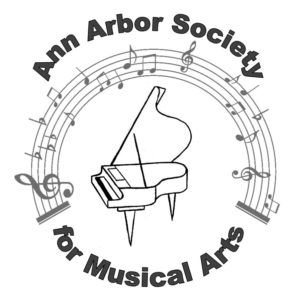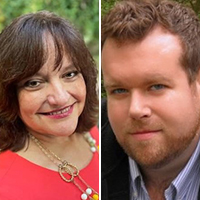A History of the Ann Arbor Society for Musical Arts, In Commemoration of its 50th Anniversary
Compiled by Nancy Murphy and Deborah Rebeck Ash
Background
Even before coming together to form the Ann Arbor Society for Musical Arts in 1965, Sigma Alpha Iota (ΣΑΙ — an International Music Sorority) and Mu Phi Epsilon (ΜΦΕ — now an International Professional Music Fraternity) collaborated together presenting programs featuring their respective alumnae members. Such a program was announced in an Ann Arbor News article on Saturday, February 27, 1954:
A program of vocal, piano, flute and harp music will be given when members of the alumnae chapters of Sigma Alpha Iota and Mu Phi Epsilon music sororities have a joint program at 8 p.m. Monday in the Rackham Building. The musicale is similar to a series held yearly by the two groups before World War II.
Another Ann Arbor News article from Wednesday, April 15, 1964, announced that the two groups would be offering a joint musicale at the Ann Arbor Women’s City Club:
A varied musical program will be offered at the Saturday evening musicale planned by the Women’s City Club to raise funds for a new grand piano for the club’s auditorium.
The program, which is being sponsored by Mu Phi Epsilon and Sigma Alpha Iota, national music sororities, will begin at 8:30 p.m. Purchase of the new piano, and Saturday’s concert, will mark the beginning of many such evenings at the club.
Frances Danforth, a member of Mu Phi Epsilon, wrote about the early beginnings of the Society for the December 1964 issue of the Mu Phi Epsilon Triangle Magazine:
The “Piano Project” in Ann Arbor is one of the outstanding club projects of the year. With the Women’s City Club in need of a new piano, Mu Phi Epsilon and Sigma Alpha Iota decided to satisfy that need.
An initial contribution from Ann Arbor’s two members, Bess Poole Seeley ΜΦΕ, and her daughter, Jean Seeley Deere ΜΦΕ, of $500 enabled the committee to buy the piano of their choice, a new Steinway “B”.
Almost as soon as it was installed on the platform of the big drawing room at the Women’s City Club, the two member sororities, Mu Phi Epsilon and Sigma Alpha Iota, put on an exciting musicale as the first money-making venture for paying off the balance due on the piano.
The subscription concert was preceded by a cocktail hour and banquet in the dining room of the club on Saturday, April 18, 1964. It was a truly gala affair with everyone present in their very best finery. The program was of the best talent that each sorority — from both the collegiate and alumni chapters — could present.
The History
The Ann Arbor Society for Musical Arts (SMA) is directed toward raising scholarship funds for outstanding young musicians who plan a career in performance and other fields of music. Six morning musicales, three in the fall and three in the spring, were organized to bring in revenue for scholarships and to give the phenomenal talents in Ann Arbor a chance to perform and win an audience.
Because many members of the two groups belonged to the Ann Arbor Women’s City Club, that organization’s spacious auditorium was available.
Before members of the Society organized the project of raising scholarship funds, we purchased a Steinway Grand Piano (size B) which we presented to the Ann Arbor Women’s City Club, where the concerts were to be held. The impetus for this purchase was provided by Marjorie Leach, ΜΦΕ past Province Governor.
She wrote Mr. Grinnell of Grinnell’s Music Store explaining all our needs. His manager in Detroit phoned after calling all their stores in the state to say the only size B available was, as fate would hand it, right here in Ann Arbor and by mistake at that.
Carol Leybourn ( Kenney) Janssen ΜΦΕ recalls: “A private client had ordered a piano, but by mistake was sent two pianos. Somehow they made a connection with Eugene Bossart and Gyorgy Sandor at the University of Michigan School of Music, who knew that we were looking for one. Grinnell’s manager, together with Professors Bossart and Sandor, helped us to acquire it.” Gyorgy Sandor was asked if he would try out the piano and give his assessment of it. He obliged immediately saying it was even and well-balanced.
Both groups contributed to its cost and committed after one of our “Angels” gave us a check to “start the ball rolling.” In under a year, we paid for it in full as our other “Angel” contributed $500 to “put us over the top.”
The City Club manifested great interest in the project to the point of donating an old piano for the down payment to insure the delivery of the new Steinway. In addition Grinnell’s gave us a very generous allowance for it, and presented the artist’s seat to us as a gift.
We have had cordial relations with the Club ever since, and the pleasant liaison has greatly benefited the Club in developing its appealing cultural side. In addition, the Club has a charming, home-like atmosphere which lends itself well to our Musicales.
The culmination of the year for the first five years or so was in April when a Gala-Benefit evening was a must at the Club. The evening, semi-formal, began with a champagne reception followed by dinner and an outstanding concert.
At the 1964 Spring annual luncheon, the piano was formally presented to the Club. The Society for Musical Arts reserved the right to care for the technical upkeep of the instrument and after seventeen years, it looked almost like new and had good care.
As to the contributors for the buying of the piano, Marjorie felt they would buy tickets to the musicales, feeling, with a proprietary air, that they owned one golden note that floated out of the piano. She was right. They felt much involved in a worthy project of raising scholarship funds.
The six Morning Musicales remain as part of the Concert series at the Ann Arbor City Club, which now includes an after-concert “Meet–the-Artist” Luncheon. In 1990, SMA filed Articles of Incorporation with the State of Michigan and subsequently was also designated as a 501(c)(3) charitable non-profit entity. Ticket proceeds from the Musicale series help SMA underwrite the costs of the two competitions each year and are, in part, a way to provide the scholarships; therefore, many of the performers are professionals who agree to perform without charge or for a modest fee in order to aid in our scholarship fund-raising efforts.
For the 50th Anniversary Celebration, the Gala Dinner and Benefit Concert is being re-activated and planned for May 15, 2015, to showcase some of our best performers and recipients of our scholarship awards.
After 50 years of use which has rendered it in need of much repair, we decided to trade the Steinway piano in for a new, upgraded instrument. King’s Keyboard House recommended to us a Yamaha 7´6˝ Concert Grand, Model C7X, which had been featured in a television commercial. This sounded great to us, and we quickly formed the “88-Key Club” so that our patrons and subscribers would have the opportunity to buy a portion of the piano and thus assist in its purchase. Graciously, Jim King of King’s Keyboard House is donating an artist’s bench and a quilted cover.
The Young Artist Competition (YAC)
This competition wasn’t begun until the piano was actually paid for, which took just under two years. Every spring since then the Society has held a formal competition. Since 1972, this was under the able chairmanship of Jill Bailiff Reyes Lambert ΜΦΕ who conscientiously planned and conducted it, choosing impartial judges. She served in this capacity for seventeen years.
The winner gave a concert in our Musicale series the next fall, always an auspicious occasion, a tradition which we maintain. The competition rotated initially as piano, strings, and voice, concentrating on one of these categories each year. As of 1973, the Society awarded $500 annually except for one year when we were able to give $800.
Starting 1984, Janice Clark ΜΦΕ was in charge of the Scholarship Competition held at The University of Michigan School of Music. We added woodwinds to the competition with very fine results in 1988.
The primary focus — providing scholarships for deserving music students — has never wavered. Past winners have come from the University of Michigan and Eastern Michigan University as well as from the local community. Some of the winners of an SMA award have risen to national prominence or to associations with major orchestras, most notably Jessye Norman, soprano.
The Rosalie Edwards Youth Music Competition (REYMC)
Named for Past SMA president Rosalie Edwards ΣΑΙ, the Rosalie Edwards Youth Music Competition was started for local students in 2003, and is also sponsored by the Society for Musical Arts in conjunction with King’s Keyboard House. The competition is open to musicians (instrumentalists and vocalists) ages 13–18 who reside in Washtenaw County. Participants in this competition are also professionally judged, and the winners also receive cash awards, publicity and a performance opportunity in the Society for Musical Arts’ Spring concert series.
About the Founders
Frances Throop ΜΦΕ, one of the founders, was a most tireless and gracious worker, giving a personal touch to the concerts and spending endless hours in preparation for each program. Jill Bailiff Reyes Lambert recalls: “Frances was a real strength, and a strong and powerful force and impetus for beginning SMA.”
Carol Leybourn (Kenney) Janssen was the first SMA program chairman and worked very hard to get the finest artists to perform. She also designed the SMA logo that we’ve used for the past 50 years.
Lottie Hutzel ΣΑΙ was the first treasurer and was a great help in setting up the books and the financial record. Gertrude Staeb ΣΑΙ worked with her and eventually became the next treasurer.
Subsequently, SMA has been led by Anita Bassett ΜΦΕ, Doris Kraushaar ΜΦΕ, Rosalie Edwards ΣΑΙ, and, currently, Penelope Fischer ΜΦΕ.
To all of these people we owe our sincere appreciation.
We begin our next 50 years with a new piano, continuing our warm partnership with the Ann Arbor City Club in its updated and lovely environment. And we hope that this philanthropic endeavor will continue to thrive as well for another 50 years.
The Current Board of Directors
Deborah Rebeck Ash, President
Penelope Fischer, Vice-President / Immediate Past President
Susan Whitener, Treasurer
Nancy Murphy, Secretary
Barbara Barclay
Virginia Gross
Gay Rosenwald




 Click
Click